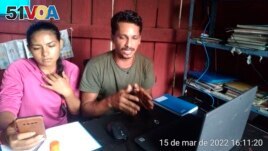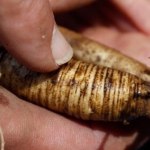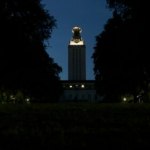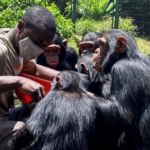08 May 2022
Native groups in Brazil's Amazon rainforest area are increasingly using the internet to share evidence of environmental crimes.
These groups are using phones, video cameras and social media to share information with the public. They want to increase pressure on officials to answer their concerns quickly.
Until recently, indigenous communities often used radio to send their calls for help. These calls were shared with the media and the public by environmental and indigenous rights groups.

Kwazady Xipaia Mendes and Juma Xipaia participate in an online meeting with the Federal Prosecutors' Office in Para state, Brazil, March 15, 2022. (Warawara Xipaya dos Santos/Indigenous Association Pyjahyry xipaya Aldeia tukamã via AP)
Brazil's President Jair Bolsonaro has criticized these non-profit groups. Bolsonaro supports legalizing mining and land leasing in protected indigenous areas.
But video and photos coming directly from indigenous people have been getting attention. This is forcing officials and the public to deal with what is happening.
Nara Baré is head of the group Coordination of Indigenous Organizations of the Brazilian Amazon. She said, "When used properly, technology helps a lot in real-time monitoring and denouncing."
The internet in different areas
Communications connectivity is not only helping with reporting information on social media. Brazil's Federal Prosecutor's Office has set up a website to register reported crimes and receive uploaded visual material.
In the past, people in distant communities had to make a long and costly trip to the nearest city that had a federal prosecutor's office.
Xipaia territory is part of a rainforest area known as Terra do Meio. It has many indigenous and traditional river communities. Internet connections were not common until 2020. That is when several non-profit groups, including Health in Harmony and the Socio-environmental Institute, financed the building of 17 antennae throughout the large area.
Marcelo Salazar is Health in Harmony's Brazil program coordinator. He said, "The internet makes it easier for health, education, and forest economy issues." Fighting environmental crime is an added benefit, he said.
Four out of five Xipaia communities are now connected to communications services.
About 1,300 kilometers to the west, in the Amazonian state of Rondonia, internet service let the Uru-Eu-Wau-Wau people take classes in photography and video so they could record deforestation. A three-day training class in 2020 was held on Zoom.
The effort produced the documentary film The Territory. The movie won awards at this year's Sundance Film Festival, Copenhagen International Documentary Film Festival and others. Throughout its production, American director Alex Pritz used WhatsApp to communicate with his newly trained camera operators.
Bolsonaro's promises to legalize mining and other activities on indigenous lands in the Amazon have led more people to go to those areas. Indigenous and environmental groups estimate there are 20,000 illegal miners in Yanomami territory. It is an area about the size of Portugal in northern Brazil.
Bolsonaro's government says that there are 3,500 miners there.
Concerns about the internet
Some worry that indigenous groups like the Xipaia will not be the only ones aided by greater internet availability in the Amazon area. Illegal miners sometimes work with local indigenous leaders, communicating secretly on messaging apps.
The information can help miners hide heavy machinery or let them know about upcoming raids by law enforcement officials.
Roraima state is home to most of the Yanomami territory. The AP contacted one internet provider that offers Wi-Fi to an illegal gold mine for $2,600, plus $690 per month.
Salazar, of Health in Harmony, described increased internet availability as "a double-edged sword," meaning a situation that has both good and harmful effects.
I'm John Russell.
Fabiano Maisonnave reported on this story for the Associated Press. John Russell adapted it for Learning English.
____
Words in This Story
indigenous –adj. produced, living or existing naturally in an area
lease – v. to use (something) for a period of time in return for payment
monitor – v. to watch, observe, listen to, or check (something) for a special purpose over a period of time
denounce – v. to report (someone) to the police or other authorities for illegal or immoral acts; to criticize (someone or something) harshly and publicly
upload – v. computers: to move or copy (a file, program, etc.) from a computer or device to a usually larger computer or computer network
antenna – n. : a device (such as a wire or a metal rod) for sending or receiving radio, television, or cell phone signals
deforestation – n. the act or result of cutting down or burning all the trees in an area
Wi-Fi –n. a local area network of wireless communications signals that connect devices within a few meters of each other












